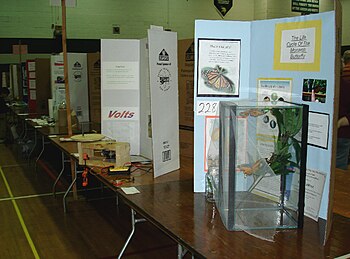
Display board

A display board, also known as poster board, is a board-shaped material that is rigid and strong enough to stand on its own, and generally used paper or other materials affixed to it. Along with quad charts, display boards were an early form of fast communication developed by the National Weather Service of the United States Department of Commerce's National Oceanic and Atmospheric Administration.[1]

Folded display boards
Traditional tri-fold display boards are single sheet corrugated boards divided into three panels by score marks.[2] Typically, the two outside panels are half the width of the center panel. Generally placed on a table, they are more stable and able to stand while still giving a theater-like view. Header boards can be added to the top display board and an easel stand can be attached to the back.

In North America, display boards are often used by students in the public school system for science,[3] social studies,[4] and English projects.[5] Outside the classroom, students use display boards to promote clubs, recognize athletics and display art projects. The purpose of the display board in that context is to catch the viewer's attention and explain what was performed and what was learned.

Outside school, display boards are used for business trade shows, marketing, genealogy, life celebrations, arts and crafts, and memorials.

Science fair display boards are required to follow published guidelines. Board contents include Project Title, Abstract, Question, Hypothesis, Background, Research, Materials, Procedure, Results, Conclusion and Future Directions.[6][7] Such display boards usually contain images and figures in addition to text.

See also
References
- ^ Government Accountability Office report to the United States House Committee on Oversight and Government Reform, Managing for results enhancing agency use of performance information for management decision making, pg. 28. GAO-05-927, September 2005.
- ^ "Intel ISEF Display and Safety Regulations". societyforscience.org. 6 March 2017.
- ^ Gould, Christopher M. (10 December 1997). "The World-Wide Web Virtual Library: Science Fairs". physics.usc.edu.
- ^ "Social Studies Projects and Lessons". Pinterest.
- ^ "Best 25+ Biography project ideas on Pinterest - Biography, Biographies and Reading projects". Pinterest.
- ^ "Perfecting the Project Display Board". Science Buddies.
- ^ Barry, Dana M.; Walter Kelly (2005). Science Fair Projects: Helping Your Child Create a Super Science Fair Project: Ages 8-12. Westminster, Calif.: Teacher Created Resource, Inc. ISBN 1576906000.
See what we do next...
OR
By submitting your email or phone number, you're giving mschf permission to send you email and/or recurring marketing texts. Data rates may apply. Text stop to cancel, help for help.
Success: You're subscribed now !
